Weekly coronavirus deaths in England and Wales rose by 17 per cent at the end of August, according to official figures.
The Office for National Statistics said there were 668 people who had Covid mentioned on their death certificate in the week ending August 27, up from 570 in the previous seven days.
There were a total of 10,268 deaths from all causes in the most recent week, with Covid behind one in 15 of them (6.5 per cent).
The 668 deaths registrations in the two countries is the highest figure since March 26, when 719 deaths were recorded. Deaths dropped as low as 84 in the week to June 11.
But they are still a far cry from the numbers in pervious waves thanks to the vaccines. There were more than 8,000 weekly Covid deaths at the peak of the second wave in January.
Of the weekly deaths where Covid was mentioned on the death certificate, the ONS said the virus was the direct cause of 586 (87.7 per cent).
The latest figures show the impact of the third wave, which began in the UK in May and has led to an increase in the number of new cases of coronavirus as well a smaller but steady rise in hospital patients.
It comes as ministers were forced to deny there are plans in place for a ‘firebreak lockdown’ in England during the October school holidays in the event that Covid hospitalisations continue to rise and put the NHS under pressure.
The PM’s official spokesperson said the reports were ‘not true’, but admitted there were some contingency plans in place only to be used as a last resort.
An unnamed SAGE source claimed the school half-term could be doubled from one week to two in late November and early October to give hospitals some breathing room.
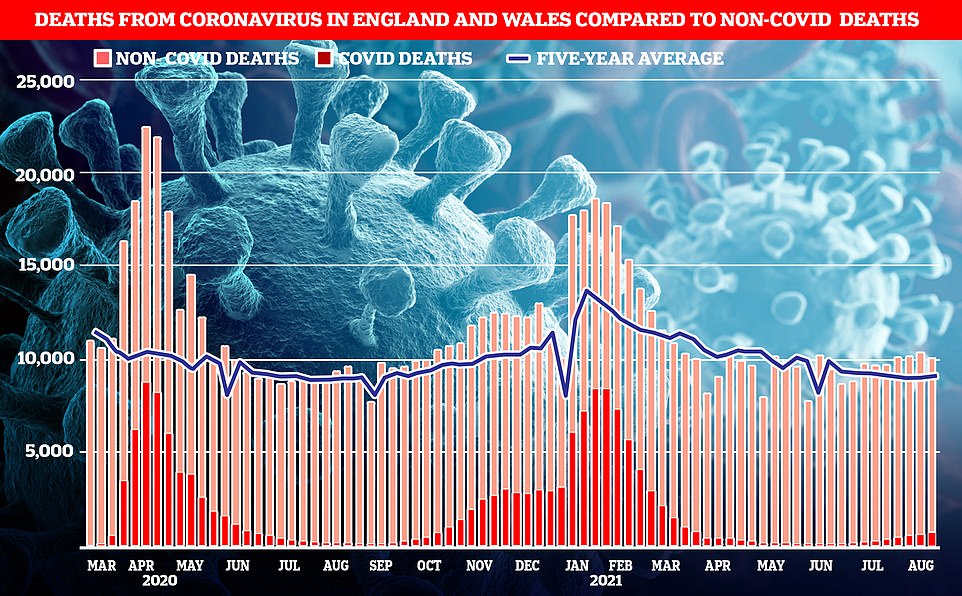
Some 10,268 deaths from all causes were recorded in England and Wales in the week ending August 27, according to the Office for National Statistics. Covid was linked to 668 fatalities (red bar), meaning 9,600 were not related to the virus (pink bar). The death numbers for the most recent week are 12.1 per cent higher than the five-year average for this time of year (blue line). The 668 Covid fatality figure is the highest recorded since March 26, when 719 deaths were recorded. Deaths dropped as low as 84 in the week to June 11. There were more than 8,000 weekly Covid deaths at the peak of the second wave in January
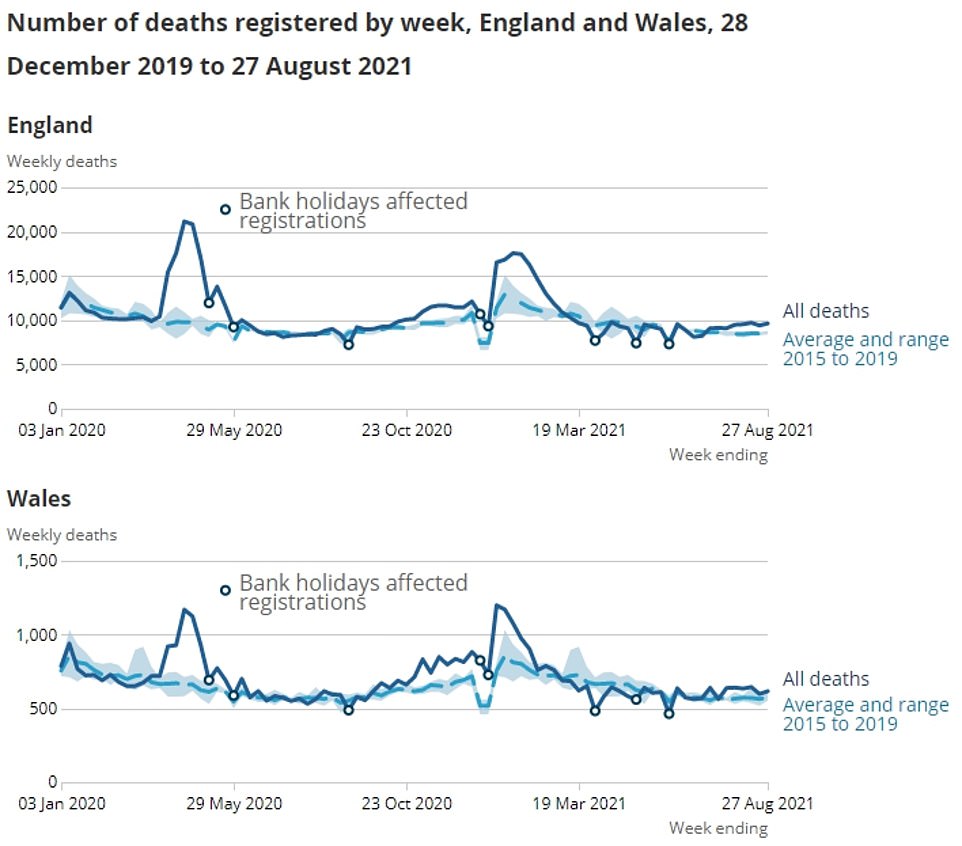
In England (top graph), 9,630 deaths were registered in the most recent week (solid blue line), which is 1,070 more and 12.5 per cent higher than the five year average (dotted line). It is also an increase of 229 deaths compared to last week. Meanwhile, 616 deaths were registered in Wales (bottom graph), 18 more deaths than the previous week and 7.5 per cent higher than the five-year average
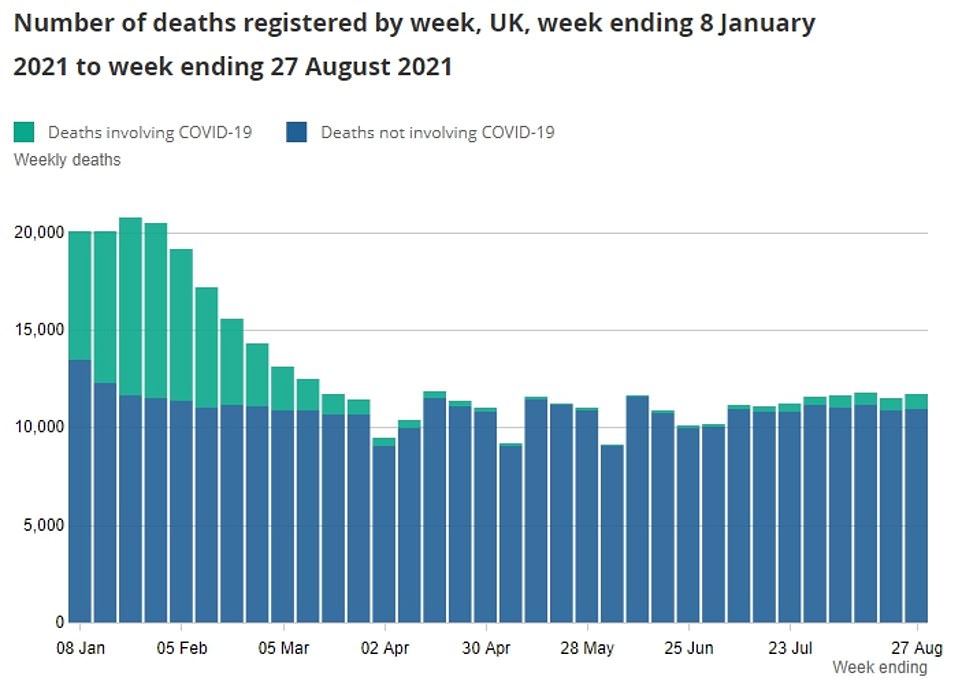
Weekly Covid deaths (green bars) peaked in the seven days up to January 29, when 8,433 fatalities were recorded. The rate then fell to a low of 84 by June 4, before starting to climb again. The most recent figure (668) is the highest it has been since March 26, when 719 Covid deaths were recorded
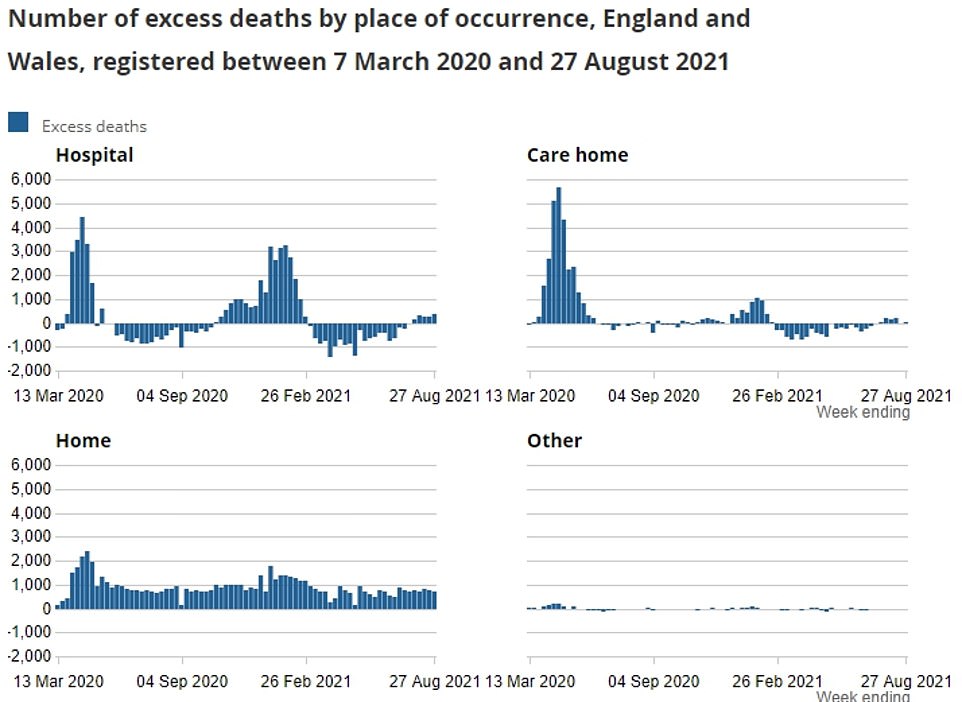
In England, 9,630 deaths were registered in the most recent week, which is 1,070 more and 12.5 per cent higher than the five year average. It is also an increase of 229 deaths compared to last week.
Of the total fatalities, 649 (6.7 per cent) involved Covid, an increase of 17.8 per cent from the 551 fatalities linked with the virus one week earlier.
Deaths that involved Covid increased in seven of the nine regions in England, with the largest increase spotted in the South East where the figure jumped 65.9 per cent from 44 to 73 in just seven days.
London saw the most deaths connected with the virus (107), followed by the North West (101), the West Midlands (75) and the South East (73).
Rolling back lockdown curbs would be ‘last resort’, Downing Street says
A so-called firebreak lockdown in England is not being planned for October half-term, but there are contingency plans that would ‘only be reintroduced as a last resort’ to protect the NHS, the Government has said.
The Prime Minister’s official spokesman said the vaccination programme provides ‘significant defences’ which the country did not have on previous occasions when restrictions were put in place.
Downing Street denied there is a plan to put in place a firebreak this autumn if there is a new surge in Covid-19 cases, but the Government said there are ‘contingency plans’ for a ‘range of scenarios’.
The comments come after the i newspaper reported an unnamed member of the Scientific Advisory Group for Emergencies (Sage) saying a ‘precautionary break’ could be part of ‘contingency plans’.
The paper quoted another unnamed source saying that ‘a firebreak lockdown is by no means out of the question’, and it was reported that could mean a two-week school half-term instead of one week.
Asked about the report, the No 10 spokesman said: ‘It is not true that the Government is planning a lockdown or firebreak around the October half-term.’
He added: ‘We have retained contingency plans as part of responsible planning for a range of scenarios, but these kind of measures would only be reintroduced as a last resort to prevent unsustainable pressure on our NHS.
‘I think we’ve been clear throughout that we will take action, and indeed we have done when necessary to protect our NHS.
‘But under the previous occasions when that action has been required, we have been without the significant defences that our vaccination programme provides us – we’re now in a much different phase.’
Advertisement
The East Midlands (60), South West (54), East (51) and North East (45) recorded the lowest number of Covid fatalities.
Deaths linked with the virus dropped in Yorkshire and the Humber (83) and the West Midlands (75), but the fatalities in these regions was still higher than most regions in the country.
Meanwhile, 616 deaths were registered in Wales, 18 more deaths than the previous week and 7.5 per cent higher than the five-year average. Some 16 of these deaths involved Covid, which is two less than one week earlier.
This marks the eighth week in a row that the ONS has reported a higher number of deaths than they would expect to see at this time of year.
Since the beginning of the pandemic last March, 882,231 people in England and Wales have died from all causes.
Of these, 144,382 (16.4 per cent) mentioned the virus on their death certificate.
And during this 17-month period, 110,595 deaths were recorded above the five-year average.
The vast majority of these fatalities were recorded in England, where 827,317 deaths occurred between March 13 and August 27, which is 106,410 more than the average from the last five years. Some 136,160 death certificates (16.5 per cent) mentioned the virus.
In Wales, 53,821 died since last March, with 8,018 deaths (14.9 per cent) being linked with Covid. The total death figure is 5,333 fatalities above the five-year average.
Of the total deaths recorded across England and Wales in the most recent week, respiratory disease was linked with 3,059 deaths, while the flu and pneumonia was linked with 1,508.
Nearly one in five of the Covid-related deaths in England and Wales were people aged 80 to 84.
And 82 per cent of the fatalities were aged 60 and over.
The number of deaths linked with Covid in each age range dropped as the groups got younger.
Meanwhile, a so-called firebreak lockdown in England is not being planned for October half-term, but there are contingency plans that would ‘only be reintroduced as a last resort’ to protect the NHS, the Government has said.
The Prime Minister’s official spokesman said the vaccination programme provides ‘significant defences’ which the country did not have on previous occasions when restrictions were put in place.
Downing Street denied there is a plan to put in place a firebreak this autumn if there is a new surge in Covid-19 cases, but the Government said there are ‘contingency plans’ for a ‘range of scenarios’.
The comments come after the i newspaper reported an unnamed member of the Scientific Advisory Group for Emergencies (Sage) saying a ‘precautionary break’ could be part of ‘contingency plans’.
The paper quoted another unnamed source saying that ‘a firebreak lockdown is by no means out of the question’, and it was reported that could mean a two-week school half-term instead of one week.
Asked about the report, the No 10 spokesman said: ‘It is not true that the Government is planning a lockdown or firebreak around the October half-term.’
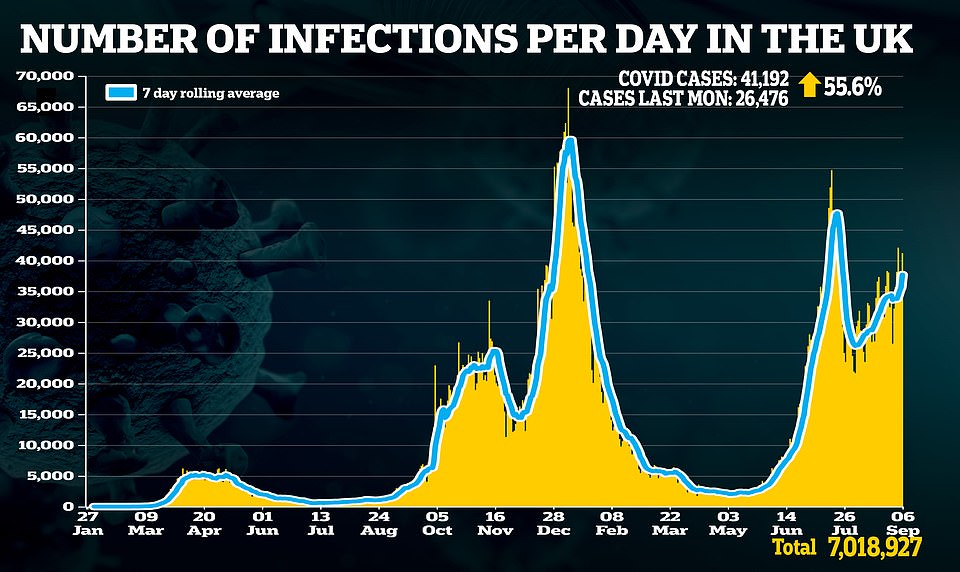
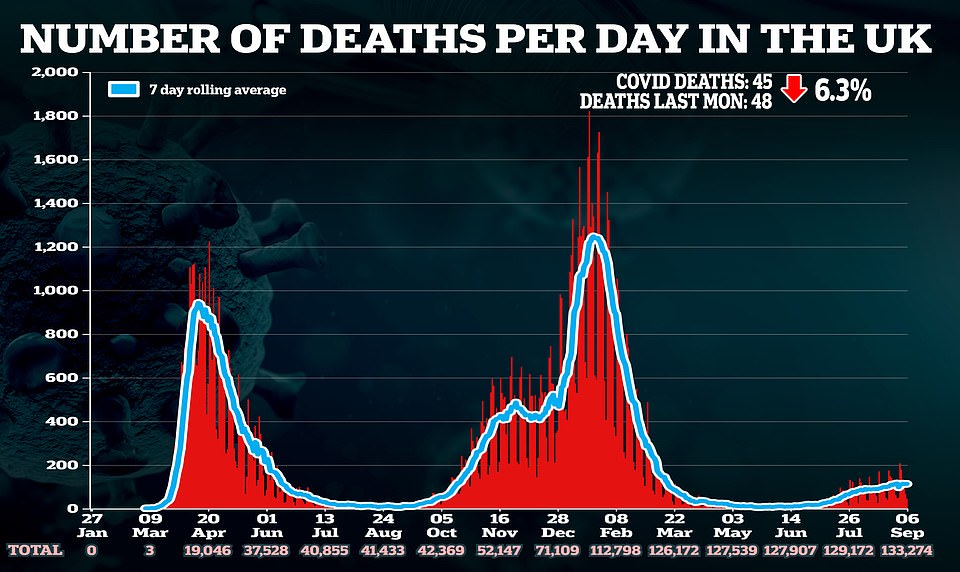
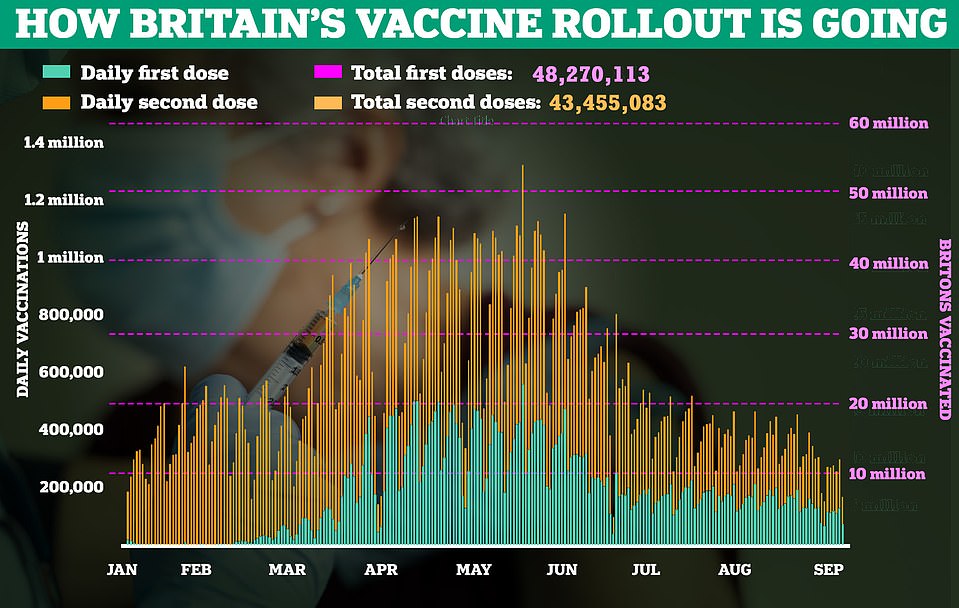
He added: ‘We have retained contingency plans as part of responsible planning for a range of scenarios, but these kind of measures would only be reintroduced as a last resort to prevent unsustainable pressure on our NHS.
PHE says it has spotted 53 cases of ‘Mu’ Covid variant in UK which is feared to be resistant to vaccines and is already spreading in 49 US states 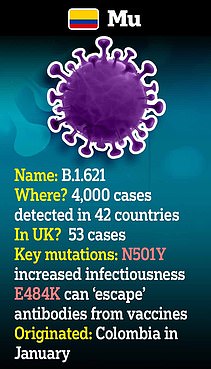
More than 50 Britons have been infected with the ‘Mu’ Covid variant which experts fear blunts the effect of vaccines and is already spreading in all but one US state.
Public Health England said it had detected 53 cases of the mutant strain after it first cropped up in the UK in May.
Scientists believe that while Mu is more transmissible than the original virus, it does not appear to be infectious enough to outcompete the Delta variant.
Delta was first detected in Britain in late March and had become dominant by May, for comparison.
Professor Lawrence Young, a virologist at Warwick Medical School, said he believed Delta represented ‘peak infectiousness’ for Covid and would be ‘very, very surprised’ if Mu or any other strain was even more transmissible.
But he warned Mu’s vaccine-resistance may make it a future threat, telling MailOnline: ‘We may have reached peak infectiousness with the Delta variant and what we have not reached, of course, is peak immune avoidance.’
No-one in the UK had died from Mu by the most recent count on August 30, but five people were admitted to hospital with it. It’s unclear how many of these were vaccinated.
PHE sources told MailOnline today they were ‘not concerned’ about the mutant virus, although its rapid spread in the US has led to growing concerns globally.
Mu has already been reported in every state except Nebraska, with Florida and California recording the highest numbers at 384 cases each. In total about 1,750 Americans have been infected with the virus, according to data.
The variant was responsible for Colombia’s deadly third infection wave between April and June, when at the peak 700 Colombians were dying per day. But the outbreak has since subsided.
Advertisement
‘I think we’ve been clear throughout that we will take action, and indeed we have done when necessary to protect our NHS.
‘But under the previous occasions when that action has been required, we have been without the significant defences that our vaccination programme provides us – we’re now in a much different phase.’
It comes after vaccines minister Nadhim Zahawi said he had not seen any plans around a firebreak and added that he hopes the virus can be dealt with ‘year in, year out’ without having to take the ‘severe measures’ seen last December.
He told BBC Breakfast: ‘Vaccines have given us the ability to reduce infections, to save 100,000 lives.
‘It is through the booster programme that I hope … we can transition the virus from pandemic to endemic status and deal with it year in, year out.
‘It is going to be with us for many years – but not have to close down our economy or take the severe measures we had to sadly take in December of last year.’
The number of deaths involving coronavirus registered each week in England and Wales has climbed to the highest level for five months.
A total of 668 deaths registered in the week ending August 27 mentioned Covid-19 on the death certificate, according to the Office for National Statistics (ONS) – the highest number since 719 deaths were registered in the week to March 26.
The latest figures show the impact of the third wave of Covid-19, which began in the UK in May, but the number of deaths is still well below the level seen at the peak of the second wave – reflecting the success of the rollout of coronavirus vaccines across the country.
It comes as a leading academic said it was ‘concerning’ that some people feel they are no longer at risk so have stopped taking steps to protect others.
Professor Robin Shattock, head of mucosal infection and immunity at Imperial College London, told Times Radio that the need to wear masks in crowded spaces and public transport was ‘still very relevant’ and urged continued caution.
Meanwhile, Prof Shattock, who leads the Imperial vaccine programme, said that next winter elderly people and the vulnerable may be given an updated booster vaccine.
The Joint Committee on Vaccination and Immunisation (JCVI) is preparing to make a decision on booster jabs for the winter, with no announcement made yet.
On whether or not vaccines need to be tweaked, Prof Shattock said the Delta variant will be observed to see if it ‘remains stable and globally dominant’.
‘If it does, then I think people will look to update the vaccine over time,’ he said.
‘In the short term, we already know that the vaccines are effective at preventing serious illness from the Delta variant so there isn’t a pressing need to rush quickly, although this can be done in a relatively short order, probably a period of six months.’
He added: ‘I would imagine that as we come round to the winter of next year we will be looking to boost at least the elderly and vulnerable populations, most likely with an updated vaccine.’
The UK’s chief medical officers are currently reviewing the wider benefits of vaccinating 12 to 15-year-olds, such as minimising school absences, after the JCVI declined to recommend a widespread rollout to the age group on health grounds alone.
Schools minister Nick Gibb has said consent from parents of healthy 12 to 15-year-olds will ‘be sought’ if Covid-19 vaccinations are approved for their children.
Speaking to the Education Select Committee on Tuesday, he acknowledged that in some ‘rare’ circumstances, like in previous vaccination programmes, teenagers can consent themselves, adding: ‘The people administering vaccines in schools are aware of these sensitive issues.’
Source link : https://www.dailymail.co.uk/news/article-9965221/Weekly-Covid-deaths-England-Wales-rise-17-668-virus-one-15-fatalities.html











